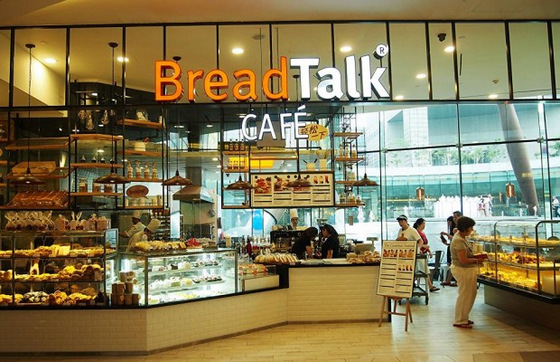
Photo credit: http://gurkhason.wordpress.com Time & date: 9.30 am, 22 April 2014
Time & date: 9.30 am, 22 April 2014
Venue: 30 Tai Seng Street, #09-01 Breadtalk IHQ
 Rusmin Ang (left) is an equity investor and the co-founder of The Fifth Person on whose site this article first appeared on 23 April 2015. He has been featured multiple times on national radio 938LIVE for his views on how to invest profitably in the stock market and his investment articles have appeared on The Business Times BTInvest and Business Insider. Rusmin is also on the speaking circuit for CIMB Securities (Malaysia) and has spoken at events in Penang, Sibu and Kuala Lumpur. Rusmin is also the co-author of Value Investing in Growth Companies which is published by Wiley, Inc. The book can be found in all major book stores worldwide and on Amazon.com, Barnes & Noble and Apple's iBooks.
Rusmin Ang (left) is an equity investor and the co-founder of The Fifth Person on whose site this article first appeared on 23 April 2015. He has been featured multiple times on national radio 938LIVE for his views on how to invest profitably in the stock market and his investment articles have appeared on The Business Times BTInvest and Business Insider. Rusmin is also on the speaking circuit for CIMB Securities (Malaysia) and has spoken at events in Penang, Sibu and Kuala Lumpur. Rusmin is also the co-author of Value Investing in Growth Companies which is published by Wiley, Inc. The book can be found in all major book stores worldwide and on Amazon.com, Barnes & Noble and Apple's iBooks.
This time last month, BreadTalk launched a new bun called 李不开你 (Can’t Leave You) to commemorate the founding father of modern Singapore, Lee Kuan Yew, upon his passing. Within an hour, the campaign sparked outrage among Singaporeans even though its sales proceeds were being donated to charity.
Whose idea was it? And more importantly, did it have any long-term negative impact on the company’s brand and sales?
When this issue was raised at BreadTalk’s most recent annual general meeting yesterday at the company’s international headquarters, Chairman George Quek addressed the question in Mandarin:
“I grew up here in Singapore and I’m just an ordinary guy from a poor family. Mr Lee gave all of us, including me, a good opportunity to live and prosper in Singapore where he devoted his whole life to building up the nation.”
For a while, he paused… The room was in a complete silence for fifteen seconds after George Quek spoke about Mr Lee’s past contributions. George Quek lift up a glass of water and took a sip. His mouth was trembling when he mumbled softly ‘对不起’ (excuse me) to all the shareholders in the meeting room.
It was the first time at an AGM where I witnessed such intense emotion from a chairman. I could see how sad he was and as I was sitting right in front I could see tears welling up in his eyes. A moment later, his wife Katherine Quek, deputy chairman of BreadTalk, took over the spotlight and commented: “Mr Lee was actually his idol.”
When Mr Quek calmed himself down, he carried on addressing shareholders’ questions. According to him, BreadTalk has been doing their part in the community and have always been lending a helping hand to those in need (i.e. Indonesian tsunami, Sichuan earthquake, etc.)
With the passing of Mr Lee, George Quek thought BreadTalk should also play its part and the idea was simple – to organize a campaign to raise money for donations to charity. As the timeline to launch the campaign was tight, the bun ‘李不开你’ was created and a hidden message behind the bun was to remind all of us to stay united after the passing of Lee Kuan Yew. Unfortunately, the campaign which started with good intentions went sour among the public. Amid nationwide criticism, BreadTalk quickly withdrew the product off the shelves and apologized to the public.
With regards to this matter, there was no significant impact on the company’s performance after the incident. However, Quek admittedly said that the greatest impact was on him personally. He didn’t expect the campaign to turn out so badly.
So besides the topic on BreadTalk’s Mr Lee faux pas, here are…
10 Key Points from BreadTalk’s AGM 2015:
- Over the years, BreadTalk has built a highly successful brand among consumerswhere now every mall owner favors having BreadTalk among its key tenants. BreadTalk is the first Singaporean company to win an award at the prestigious World Retail Awards in Paris in 2014. Being a brand leader, there is an unwritten rule where competitors hope for BreadTalk to raise prices first so they can follow suit.
- Every retailer faces the ongoing challenge of rising rental and labor costs in Singapore. To mitigate this, BreadTalk with its group of well-known brands (Food Republic, Toast Box, BreadTalk, Ding Tai Fung, etc.) allows the company to negotiate better rental rates with landlords and charge higher prices among customers.
- Thailand is going to be the next key market for BreadTalk after Singapore and China. BreadTalk took nine years to build 19 BreadTalk and Toast Box stores in Bangkok. With the new joint venture with Minor Group who own over 2,000 F&B outlets in Thailand, the management plans to open ten new stores in 2015 and is confident of having 60-100 stores in the country eventually.
- Besides overseas expansion, there is also room for growth in its homegrown market in Singapore. The management thinks that it would not be difficult to open 100 Toast Box outlets here from the 60 outlets currently. Moreover, other than growing existing brands, there is always room to start a launch new brand concepts like 1933which is debuting at the new mall Capitol Piazza in June.
- RamenPlay has underperformed and the management has closed down a few outlets. On the other hand, the company launched two Sanpoutei Ramen restaurants (in Holland Village and Shaw House) and their performance has been very encouraging so far. Sanpoutei could be the next key growth driver for BreadTalk’s Japanese ramen segment should the brand prove to be popular and management decides to scale down its investment in RamenPlay.
- BreadTalk never hesitates to strengthen its competitive advantage. The company took the opportunity to integrate with their real estate investments in Katong Mall, CHIJMES and 111 Somerset and secure key retails spaces to prominently showcase their brands.
- There is no plan to convert three existing junior bonds amounting to $37 million into an equity stake. In other words, BreadTalk would earn an annual income of 3-8% from these bonds till 2018.
- The financing cost for BreadTalk is extremely low. The management didn’t specifically disclose how low it was, however my own research tells me that BreadTalk’s interest rates was less than 2% in 2014! With the low interest rate, the management is reluctant to swap its floating-rate loans to fixed rates citing it would cost an additional of 3-4%. No one knows which way interest rates may go but CEO Oh Eng Lock reiterated there are various financing options available for the company due to its strong cash flow generation ability.
- There is a delay in BreadTalk’s loyalty card programme. According to the CEO, the card is likely to come with a payment function (like Starbucks) rather than simply a card to chalk up stamps for free items like so many other loyalty cards in your wallet.
- Lastly, George and Catherine Quek collectively own a 52.5% stake in BreadTalk. Despite numerous buy-out offers in the past few years, these two key founders have not sold any of their stakes away. This is a good sign for shareholders that these two key insiders are here to stay for the long haul.







